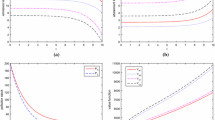Abstract
In this paper we analyze how restricting intertemporal trading by prohibiting borrowing of emissions permits affects the ability of a dominant agent to exploit its market power. We show that the monopolist could take advantage of the constraint on borrowing by not distributing the sale of permits cost-effectively across periods. Furthermore, we show that a constant present-value price over time does not imply a cost- effective distribution of abatement (permit sales) across periods.
Similar content being viewed by others
References
Bernstein PM, Montgomery WD, Rutherford T, Yang G-F (1999) Effects of restricting intertemporal permit trading: the MS-MRT model. Energy J Special Issue:221–256
Böhringer C (2002). Climate policy from Kyoto to Bonn: from little to nothing?. Energy J 23: 51–73
Böhringer C and Löschel A (2003). Market power and hot air in international emissions trading: the impacts of U.S withdrawal from Kyoto-protocol. Appl Econo Bd 356: 651–664
California Air Resource Board (2003) The california low-emission vehicle regulation. http://www.arb.ca.gov/msprog/levprog/cleandoc/clean_complete_lev_regs_as_of10_16_02final.pdf
EPA (2003) Clean air act amendment, Section 765 1b, http://www4.law.cornell.edu/uscode/42/7651b.html
Hagem C and Westskog H (1998). The design of a dynamic tradeable quota system under market imperfections. J Environ Econ and Manage 36: 89–107
Hahn RW (1984) Market power and transferable property rights. Q J Econ 99:753–765,89–107
Lewis TR (1976). Monopoly exploitation of an exhaustible resource. J Environ Econ and Manage 3: 198–204
Liski M and Montero J-P (2005). A note on market power in an emission permits market with banking. Environ Resour Econo 31: 159–173
Malueg DA (1993). Bounding the welfare effects of third-degree price discrimination. Am Econ Rev 83(4): 1011–1021
Robinson J (1933). The economics of imperfect competition. Maximillan, London, UK.
Rubin J (1996). A model of intertemporal emission trading, banking and borrowing. J Environ Econ Manage 31: 269–286
Schmalensee R (1981). Output and welfare implications of monopolistic third-degree price discrimination. Am Econ Rev 71: 242–247
Stiglitz JE (1976). Monopoly and the rate of extraction of exhaustible resources. Am Econ Rev 66(4): 655–661
Tietenberg (1985). Emission trading: An exercise in reforming pollution policy. Resources for the Future, Washington D.C.
Varian HR (1985). Price discrimination and social welfare. Am Econ Rev 75: 870–875
Varian HR (2003). Intermediate microeconomics. 6th edn.W.W. Norton Company, New York
Westskog H (1996). Market power in a system of tradeable CO2-quotas. Energy J 17: 85–103
Weyant J, Hill J (1999) Introduction and overview to the costs of the Kyoto protocol: a multi-model evaluation. Energy J Special Issue:vii–xliv
Author information
Authors and Affiliations
Corresponding author
Additional information
Comments from Odd Godal, Michael Hoel, Steinar Holden, Lynn P. Nygaard Asbjørn Aaheim and an anonymous referee are highly appreciated.
Rights and permissions
About this article
Cite this article
Hagem, C., Westskog, H. Intertemporal Emission Trading with a Dominant Agent: How does a Restriction on Borrowing Affect Efficiency?. Environ Resource Econ 40, 217–232 (2008). https://doi.org/10.1007/s10640-007-9149-9
Received:
Accepted:
Published:
Issue Date:
DOI: https://doi.org/10.1007/s10640-007-9149-9




